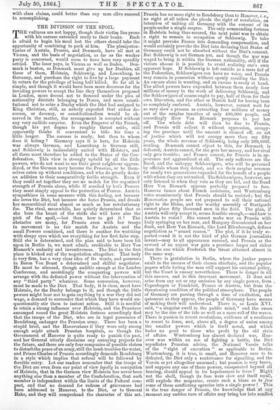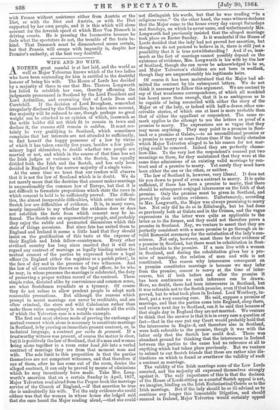THE DIVISION OF THE SPOIL. T EE vultures are not happy,
though their victim lies prone with his carcase extended ready to their beaks. Each is afraid to begin his meal lest the others should take the opportunity of combining to peck at him. The plenipoten- tiaries of Austria, Prussia, and Denmark, have all met at Vienna, and the basis of negotiation, as far as the weaker party is concerned, would seem to have been very speedily settled. The loser pays, in Vienna as well as Baden. Den- mark is beaten, so Denmark must give up her Duchies, all three of them, Holstein, Schleswig, and Lauenburg, to Germany, and purchase the right to live by a large payment in return for the privilege of being half killed. So far all is simple, and though it would have been more decorous for the invading powers to accept the line they themselves proposed in London, more decent not to demand under the plea of nationality districts belonging to Danes, and more consti- tutional not to seize a Duchy which the Diet had assigned to King Christian, still, as nobody expected that either de- corum, or decency, or constitutionalism would be ob- served the matter, the arrangement is accepted without any very audible surprise. Even the Emperor of the French, though his pet dogma is roughly thrust aside, still apparently thinks it convenient to bide his time a little longer. The carcase is ready, but then to whom does it belong ? Germany says it is hers, for Holstein was always German, and Lauenburg is German still, and Schleswig is indissolubly united with Holstein, and all three must therefore be added to the States of the Con- federation. This view is strongly upheld by all the little powers, who do not want to see their great neighbour aggran- dized, or the German navy becOme the Prussian, or be them- selves eaten up without conditions, and who do greatly desire au addition to their comparatively feeble strength. Even if they could act together they are no match for the organized strength of Prussia alone, while if assailed by both Powers they must simply appeal to the protection of France. Austria sympathizes in some measure with this feeling, not because she loves the Diet, but because she hates Prussia, and dreads her monarchical rival almost as much as her revolutionary foe. The rival, meanwhile, has quietly determined that as she bore the brunt of the strife she will have also the pick of the spoil,—but then how to get it ? The -obstacles are many, for Prussia even with her troops in movement is no fair match for Austria and the small Powers combined, and there is another foe watching with sleepy eyes which see everything for her first false step. Still she is determined, and the plan said to have been bit upon in Berlin is, we must admit, creditable to Herr Von Bismark's audacity and inventiveness. The Diet in the first place is kicked out of the negotiation altogether. That body is very firm, has a very clear idea of its wants, and possesses in Baron Von Beust a determined and skilful negotiator. He must be silenced, though audible enough at the London Conference, and accordingly the conquering powers will arrange with the defeated power without the intervention of any "third party" whatever. Some concession, however, must be made to the Diet. That body, it is clear, must have Holstein, for the Duchy belongs to it, and though the little powers might bear not to gain anythine.c by a war they did not wage, a demand to surrender that which they have would un- questionably stir them to instant action. Still it is needful to retain a strong influence over Holstein, and the Prussians -encamped round the great Holstein fortress accordingly find that the troops of the Diet, who are in legal possession of Rendsburg, endanger the Prussian army. There has been a stupid broil, and the Hanoverians if they were only strong enough might attack Prussian hospitals, so though the Government of Hanover is quite ready to punish the past, and her General utterly disclaims any annoying projects for the future, and there are only four companies of possible rioters to disturb the peace of an army, still the lamb troubles the water, and Prince Charles of Prussia accordingly demands Rendsburg in a style' which implies that refusal will be followed by forcible entry. Let our readers remember that the troops of the Diet are even from our point of view legally in occupation of Holstein, that in the German view Holstein has never been anything else than a member of the Confederation, that each =ember is independent within the limits of the Federal com- Ea:it, and that no demand for redress of grievances had been addressed to Hanover, to the Diet, or to General Hake, and they will comprehend the character of this act. Prussia has no more right to Rendsburg than to Hanover, i. e., no right at all unless she pleads the right of revolution, an intention of uniting all Germany with the consent of its people under a single sceptre. The only commanding fortress in Holstein being thus secured, the next point was to obtain a right to remain in occupation of Schleswig. To take it might provoke France into demanding compensation, and would certainly provoke the Diet into declaring that States of Germany couldnot be absorbed without the Diet's consent. i But Schleswig is not German yet, and though the war was waged to bring it within the German nationality, still if tie victors choose it is possible to avoid realizing one's own apparent hope. If Schleswig is left outside as a mere fief of the Federation, Schleswigers can have no voice, and Prussia may remain in possession without openly assailing the Diet. An excuse alone is wanting, and an excuse is ready at hand. The allied powers have expended between them nearly four millions of money in the work of delivering Schleswig, and the Schleswigers of course ought to pay, half of them for their own liberation, and the other or Danish half for having been so completely enslaved. Austria, however, cannot wait for so very slow a process as extracting four millions of money out of the surplus taxation of only 400,000 people, and accordingly Herr Von Bismark proposes to pay her off. The whole debt will then be due to Prussia, and Prussia will collect it without oppression, occupy- ing the province until the amount is cleared off, an act of justice which will not occupy more than say fifty years, the whole revenue of Schleswig being only 200,0001. sterling. Denmark cannot object to this, for Denmark is defeated; Austria cannot, for she gets her money, and her rival only gets trouble ; and France cannot, for Prussia is in ap- pearance not aggrandized at all. The only sufferers are the Bund, and the unhappy Schleswigers, who will be governed by officials whom they detest, and ace their surplus revenue for nearly two generations expended for the benefit of a people with whom they are notunited. The Schleswigers, however, are only listened to when they vote as they are bid, and the Bund Herr Von Bismark appears perfectly prepared to face. Hanover fumes about French assistance, and Wurtemburg votes unanimously that Prussia should be resisted ; but the Hanoverian people are not prepared to sell their national right to the Rhine, and the worthy assembly of Stuttgardt cannot place fifty thousand men in the field. The plan, if Austria will only accept it, seems feasible enough,—and how is Austria to resist? She cannot make war on Prussia with Italy springing on her rear, and Hungary discontented on her flank, and Herr Von Bismark, like Lord Ellenborough, defines negotiation as " armed reason." The plot, if it be truly re- ported—and it is not the kind of plot German journalists invent—may to all appearance succeed, and Prussia as the reward of an unjust war gain a province larger and richer than the one which Frederick the Great obtained almost in the same way.
There is gratulation in Berlin, where the junker papers exult in the success of their chosen chieftain, and the popular papers while hating the man still support his external policy, but the Court is uneasy nevertheless. There is danger in all this success, and in this incessant movement. It does not arise from any act or any omission by any single power, from Copenhagen or Frankfort, France or Austria, but from the threatening condition of the political atmosphere. The people of Germany are passing through a time of exaltation, and quiescent as they appear, the people of Germany have means of making their will understood. There is, as Louis XVI. said, " a singular swell in the public mind," and the cause may be the rise of the tide as well as a mere roll of the waves. There is passion in recent resolutions, evidence of a readiness to resort to force, and, above all, a degree of union among the smaller powers which is itself novel, and which bodes no good to those who profit by the old state of affairs. Wurtemburg has almost declared war, Han- over was within an ace of fighting a battle, the Diet repudiates Prussian advice, the National Verein talks of the " right of execution " as applicable to Berlin. Wurtemburg, it is true, is small, and Hanover sure to be defeated, the Diet only a contrivance for signalling, and the Verein as yet altogether unarmed ; but passion is very brave, and suppose any one of these powers, exasperated beyond all bearing, should appeal in its hopelessness to force ? Might not the shell, though its fuse were slow and itself small, still explode the magazine, create such a blaze as to fuse some of these conflicting agencies into a single power ?. This is the true danger of Prussia, the knowledge that at any y moment any sudden turn of affairs may bring her into conflict































 Previous page
Previous page